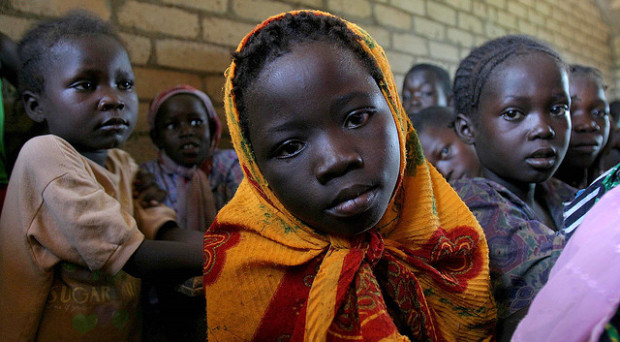
What is female genital mutilation?
Female genital mutilation/cutting (FGM/C) involves all procedures that intentionally alter or cause injury to female genital organs for non-medical reasons. It is estimated that over 125 million women globally have undergone FGM/C and three million girls a year are at risk in Africa each year. The procedure is usually carried out on girls between birth and 15.
FGM/C is a deeply rooted cultural practice most common in 29 countries in Africa, the Middle East and some Asian countries, but due to migration is found much more widely in Europe, the USA, Australia and New Zealand.
FGM/C confers no health benefits but can result in many complications such as urinary problems, complications at child birth as well as psychological problems. It is a violation of human rights and an extreme marker of gender inequality.
Health care professionals globally are important in the elimination of FGM/C and need to be aware of FGM/C –not only to support women living with the consequences of the procedure, and deal with complications, but to act to prevent FGM/C occurring and protect at risk children.
Raising awareness of the issue
I am ashamed to admit that throughout my medical training and career, which included working in Obstetrics and Gynaecology, paediatrics and sexual and reproductive health before entering General Practice, FGM/C was never mentioned.
It wasn’t until I left my consulting room to undertake a Masters in Public Health that I had my eyes opened to this global problem.
Despite many child protection training courses I still had not encountered this as an issue. It wasn’t until I left my consulting room to undertake a Masters in Public Health that I had my eyes opened to this global problem.
Fortunately it appears that the world has woken up to the issue too; in the UK there has been much political and media attention to the subject recently.
This has included addressing the importance of the education and training of health professionals about the practice and guidance of how to manage women with FGM/C and also what to do if they identify a child at risk.
The importance of health care professionals
General Practitioner’s (GPs) are in a prime position to address FGM/C; they are often the first contact patients have with the health service and are familiar with the communities in which they work. The Royal College of General Practitioners has recommended that the curriculum addresses the issues related to FGM/C, and they have developed an online learning module which includes FGM/C.
GPs are not the only ones important in tackling the problem of FGM/C; this requires a multisectoral approach.
The college has also produced, in conjunction with the National Society for the Protection of Children (NSPCC) a toolkit for safeguarding children and young people, which contains reference specifically to FGM/C.
GPs are not the only ones important in tackling the problem of FGM/C; this requires a multisectoral approach and this has been recognized in the production of guidelines on the identification, recording and reporting of FGM in the UK, which includes healthcare workers, social services, education and police all working together to address the problem.
The guidelines and educational tools are all helpful but must translate to practice and lead to reducing the number of affected women and girls. Barriers exist that may prevent GPs identifying FGM/C including language and communication difficulties or issues relating to cultural sensitivity.
Tackling the issue around the world
In Tackling FGM in the UK, health professionals operate in a supportive legislative environment. There is a link between prosecution and prevention. In the UK we have seen the first prosecution of a doctor over FGM/C; he was subsequently acquitted earlier this year.
This highlighted the need for improved training for doctors and a call for Health Education England’s FGM e-learning programme to be mandatory for all trainees in Obstetrics and gynaecology. (Health Education England’s FGM e-learning programme).
Further legislative support has been the introduction of mandatory reporting of FGM by health and social care professionals and teachers, and the introduction of the FGM Protection Orders which came into force in July of this year which can prevent potential victims being taken abroad to have FGM/C performed.
Monthly data collection of identified cases of FGM from acute hospital trusts now occurs and identifying cases and prevalence is a further step towards prevention of the practice.
France has gone a step further with medical checks, including examination of genitalia, on all girls up to age 6 to be carried out by health professionals. However this has not been replicated in the UK due to the intrusive nature of the examination which itself could be traumatic and for concerns about alienating the patients and communities.
However it must be remembered that in some countries, rather than being part of the solution, health professionals are contributing to the perpetuation of the practice by performing the procedure.
Health care professionals and legislation are important but it is vitally important to work within the practising communities to lead to abandonment of FGM/C.
This medicalization of FGM/C is thought to be a harm reduction strategy, being safer and leading to fewer complications. The WHO has urged health professionals to stop this practice. It violates the medical code of ethics and conveys approval for the procedure.
Health care professionals and legislation are important but it is vitally important to work within the practising communities to lead to abandonment of FGM/C. There are positive steps against FGM/C occurring all the time, across the globe.
Just recently, on the 23rd November 2015 the Gambian president announced the practice would be outlawed in his country; in the same month Australia saw its first prosecutions for FGM.
It is hoped that continued effort from many players in many countries will lead to the elimination of FGM/C in one generation.
Comments